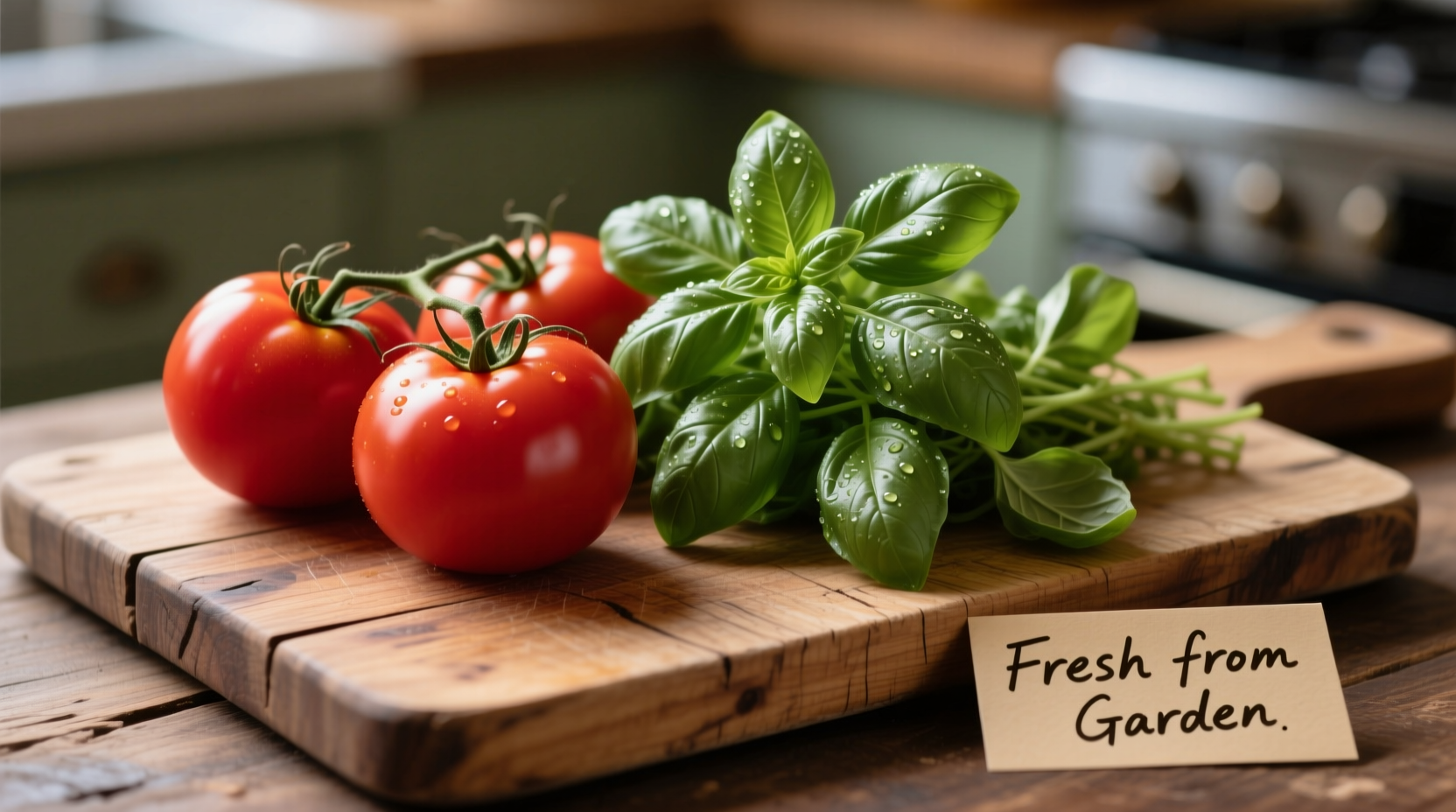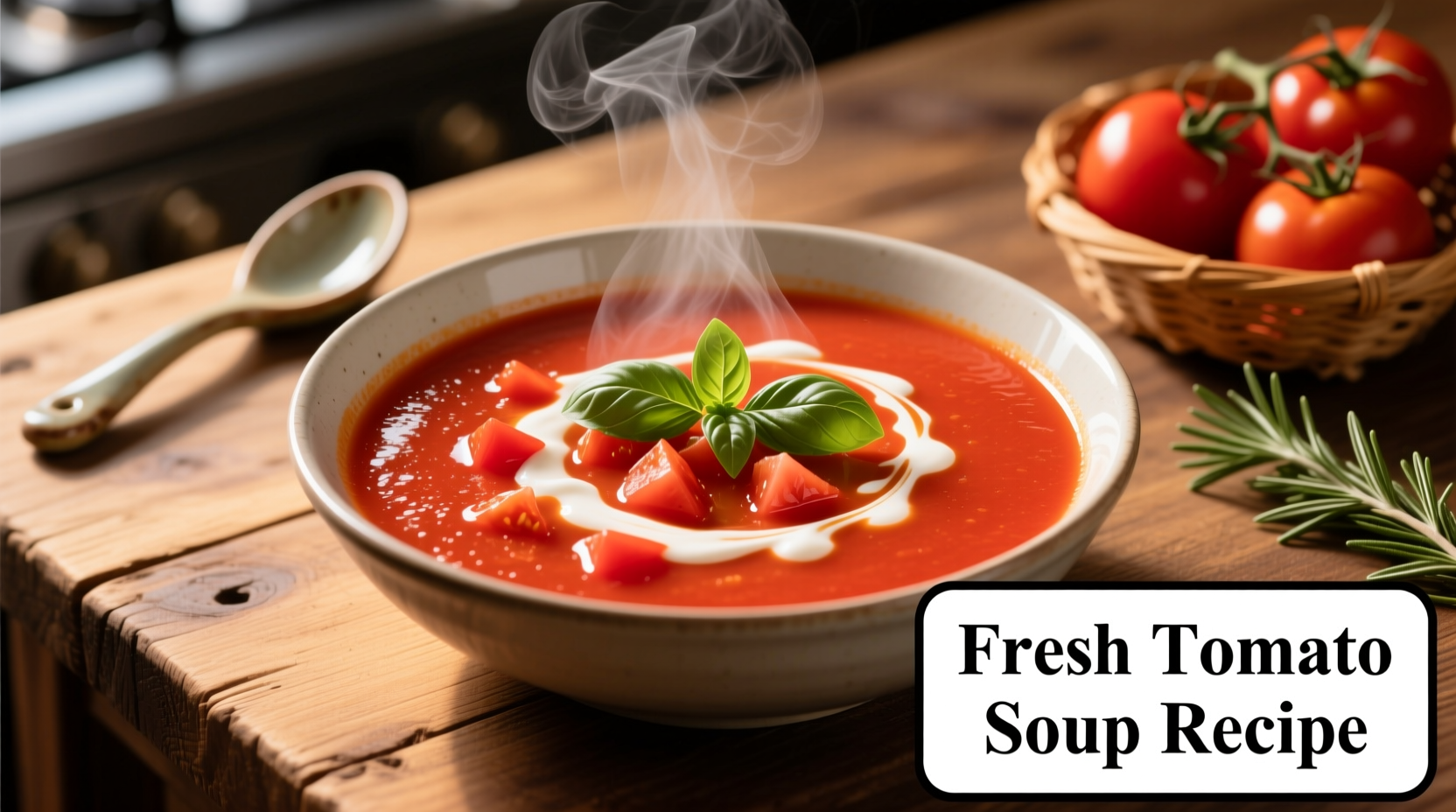There's nothing quite like homemade fresh tomato soup made with ripe, in-season tomatoes. Unlike canned alternatives, fresh tomato soup bursts with summer flavor and requires surprisingly few ingredients to create a restaurant-quality dish at home. This comprehensive guide provides everything you need to make perfect fresh tomato soup every time.
Why Fresh Tomatoes Make Superior Soup
While canned tomatoes have their place in winter cooking, fresh tomatoes offer distinct advantages when they're in season. The natural sugars in vine-ripened tomatoes create a sweeter, more complex flavor profile that canned versions simply can't replicate. According to the USDA Agricultural Research Service, tomatoes harvested at peak ripeness contain up to 30% more lycopene and vitamin C than those picked early for shipping.
| Characteristic | Fresh Tomato Soup | Canned Tomato Soup |
|---|---|---|
| Flavor Complexity | Bright, nuanced, varies by tomato variety | Consistent but less complex |
| Nutrient Content | Higher in vitamins C and A | Slightly reduced due to processing |
| Seasonality | Summer through early fall | Year-round availability |
| Preparation Time | 45 minutes | 15-20 minutes |
Selecting the Perfect Tomatoes for Soup
Not all tomatoes work equally well for soup. For the best results, choose varieties known for their balance of sweetness and acidity:
- Roma (plum) tomatoes: Lower water content makes them ideal for thick, rich soup
- Heirloom varieties: Offer complex flavor profiles but may require longer simmering
- Vine-ripened tomatoes: Provide the best balance of sweetness and acidity
Look for tomatoes that feel heavy for their size with smooth, unblemished skin. They should yield slightly when gently squeezed but not feel mushy. Avoid refrigerating tomatoes before use, as cold temperatures destroy flavor compounds according to research published in the Journal of Agricultural and Food Chemistry.

Essential Tools and Prep Work
Before you begin cooking, gather these kitchen essentials:
- Large heavy-bottomed pot (enameled cast iron works best)
- Immersion blender or regular blender
- Sharp chef's knife and cutting board
- Wooden spoon
- Mesh strainer (optional for ultra-smooth texture)
Prep your ingredients while your pot heats up. You'll need:
- 2.5 lbs ripe tomatoes, cored and quartered
- 1 medium yellow onion, diced
- 3 garlic cloves, minced
- 2 tbsp olive oil
- 1 cup vegetable broth
- 1/4 cup fresh basil, chopped
- Salt and freshly ground black pepper to taste
Step-by-Step Fresh Tomato Soup Recipe
This simple method maximizes flavor while minimizing effort. Total time: 45 minutes.
- Sauté aromatics: Heat olive oil in your pot over medium heat. Add onions and cook until translucent (5-7 minutes), then add garlic and cook for 1 minute until fragrant.
- Add tomatoes: Add quartered tomatoes and vegetable broth. Bring to a gentle simmer.
- Simmer: Reduce heat to low, cover, and simmer for 25 minutes, stirring occasionally.
- Blend: Use an immersion blender to puree the soup until smooth. For extra smooth texture, strain through a fine mesh sieve.
- Finish: Stir in fresh basil, then season with salt and pepper to taste.
- Serve: Ladle into bowls and add your preferred garnish.
Three Delicious Flavor Variations
Once you've mastered the basic recipe, try these chef-approved variations:
Creamy Fresh Tomato Basil Soup (Dairy)
After blending, stir in 1/2 cup heavy cream or coconut milk for a dairy-free alternative. The fat content helps carry the tomato flavors more effectively, creating a richer mouthfeel without overpowering the fresh tomato taste.
Roasted Fresh Tomato Soup
For deeper flavor, roast tomatoes first: Toss quartered tomatoes with 1 tbsp olive oil, salt, and pepper. Roast at 400°F for 30 minutes before adding to the pot. Roasting concentrates flavors and adds subtle caramelized notes that enhance the soup's complexity.
Spicy Arrabbiata-Style Fresh Tomato Soup
Add 1/2 tsp red pepper flakes with the garlic and finish with a squeeze of fresh lemon juice. The acidity balances the heat while highlighting the tomatoes' natural sweetness—a technique perfected in Italian coastal cooking traditions.
Serving Suggestions and Storage Tips
Fresh tomato soup shines when served with complementary elements that enhance rather than mask its bright flavor:
- Top with fresh basil leaves and a drizzle of high-quality olive oil
- Pair with grilled cheese sandwiches made with artisanal bread
- Add a dollop of pesto for an herbaceous finish
- Serve with crusty bread for dipping
Store leftovers in an airtight container in the refrigerator for up to 4 days. For longer storage, freeze in portion-sized containers for up to 3 months. When reheating, add a splash of broth or water as the soup may thicken when chilled.
Troubleshooting Common Fresh Tomato Soup Issues
Even experienced cooks encounter challenges with fresh tomato soup. Here's how to solve common problems:
- Soup is too acidic: Add a pinch of baking soda (1/8 tsp at a time) or a teaspoon of sugar to balance acidity without making the soup sweet.
- Soup is too thin: Simmer uncovered for 5-10 minutes to reduce, or add a tablespoon of tomato paste during cooking.
- Lack of depth: Roast tomatoes first or add a Parmesan rind while simmering for umami boost.
- Bitter flavor: Remove seeds and excess gel from tomatoes before cooking, as these contain most of the bitterness.
When Fresh Tomatoes Work Best (and When They Don't)
Understanding context boundaries helps you make better cooking decisions. Fresh tomatoes excel in soup during peak season (July-September in most temperate climates) when they're at their sweetest and most flavorful. However, during off-season months, high-quality canned San Marzano tomatoes often provide better consistency and flavor than underripe grocery store tomatoes.
The FDA recommends cooking tomatoes thoroughly to maximize lycopene availability, but avoid overcooking which can create a flat, one-dimensional flavor. For best results, simmer fresh tomato soup just long enough to blend the flavors—typically 25-30 minutes.











 浙公网安备
33010002000092号
浙公网安备
33010002000092号 浙B2-20120091-4
浙B2-20120091-4